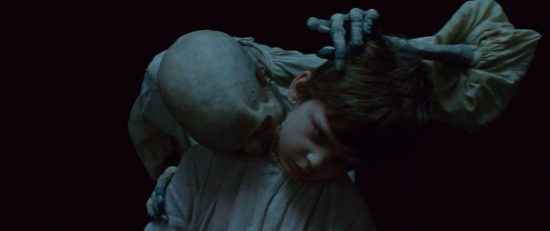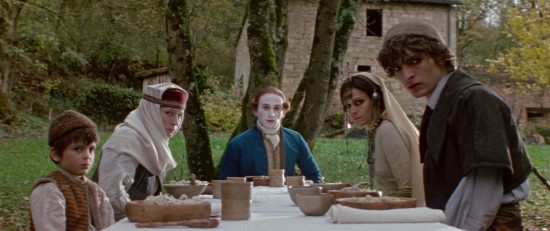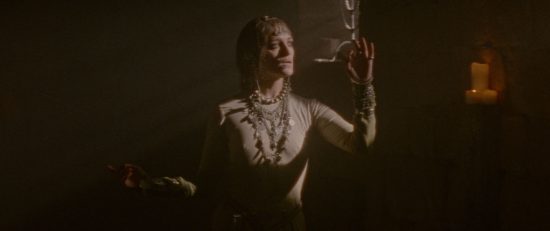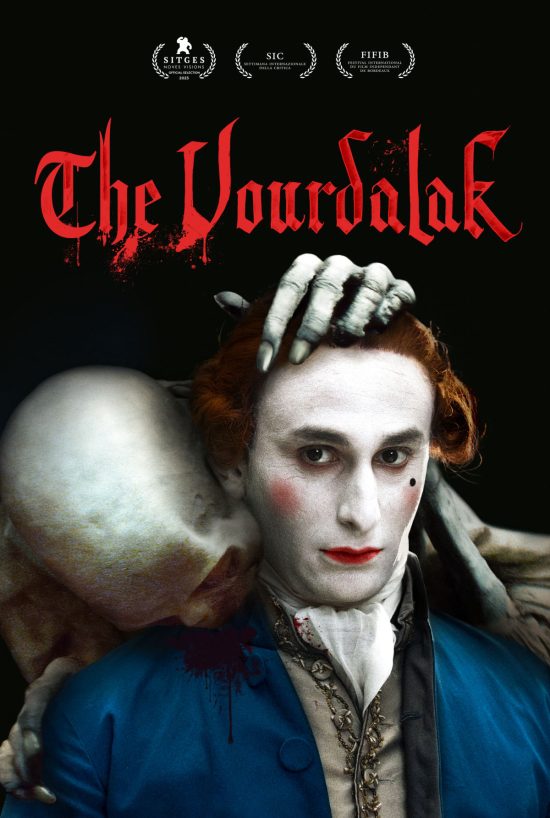Review: The Vourdalak – “A fabulous new entry into the vampire film genre.”
Directed by Adrien Beau
Starring Kacey Mottet Klein, Ariane Labed, Grégoire Colin, Vassili Schneider, Gabriel Pava, Claire Duburcq
It’s the traditional dark and stormy night, as the foppish Marquis Jacques Antoine Saturnin d’Urfé, an aristocratic envoy of the king of France (complete with powdered wig and painted face) batters on a formidable door, seeking aid. His escort has been slaughtered by bandits, his baggage and horses stolen. The man within only peers out through a slatted grille – he informs the Marquis that he opens this door for no-one after dark (shades of classic Hammer films, the villagers locked up at night, terrified), but he does at least advise him to travel on (without stopping) through the night to the home of the venerable Gorcha, who will assist him.
Left with no choice, the Marquis (Kacey Mottet Klein, playing him just like the fish out of water that he is, more suited to the meaningless rituals of court life than traversing the wilds) does as instructed. As the new day breaks he comes across a couple of figures as he wanders through the forest, a mysterious, beautiful woman, Sdenka(Ariane Labed), and then Piotr (Vassili Schneider), who turn out to be the daughter and son of Gorcha’s household. In reaching their home, the oldest brother, a gruff man called Jegor (Grégoire Colin), hears his pleas, and despite not being the friendliest, agrees to assist him, but he will have to wait a day for a horse.
This is a household with a missing patriarch, however – Gorcha himself is absent, and Jegor, the oldest son, is trying to fill in as best he can, although his younger siblings are clearly chafing at his attempts to be as tough and hard-line as their venerable father. Gorcha has left to hunt down Turkish bandits, but left an ominous warning to his family: he would return in six days. If he returned even an hour after those six days, then it is not him, but a Vourdalak that returns, and on no account should they give it admittance to the home, no matter how much it may sound like him, or what it says.
While Piotr, Sdenka and Jegor’s wife Anja (Claire Duburcq) seem to believe in this warning, Jegor is scornful of such superstitions, asking the Marquis, as an educated man, how anyone can believe such nonsense. As they eat at an outdoor table, they spot a fallen, emaciated body by the edge of the woods, which turns out to be their father. The others are all apprehensive – it is just past the six-day deadline, but Jegor tells them off for their concerns, and angrily demands how long could their poor father have lain there without them noticing?
Of course, he is brought to the table and then into the home – after all, if the warnings had been followed, there wouldn’t be much of a story, would there?? And despite looking very much like a barely animated cadaver, Gorcha still commands obedience – this is a very patriarchal society, and he is in charge, and that’s it – despite all their fears the others all fall into line, setting up the events of the second half of the film.
I’ve been looking forward to seeing this since first hearing of some excited reviews from the film festival circuit, and, being an old Gothic Fiend, I have long been familiar with the short 1839 story by Aleksey Tolstoy which inspired it. Predating Stoker’s Dracula by half a century, this draws far more on the then-common legends of vampiric-type creatures, which were often little more than revenants, reanimated corpses which usually rose at night to feed on their families and neighbours, miles away from the debonair, castle-dwelling, Satanic lord of the Dracula model (inspired by Byron, and Polidori’s “The Vampyre”), which is more common in cinema.
This has a much more folk-horror feel to it, appropriately, given the source material draws on those eastern European myths of vampires that so fascinated the salons of early 19th century Europe (then as now, our culture seems very drawn to these nocturnal blood drinkers, and cinema has been in love with them almost from its beginnings). The low budget is no bar here – a nice, remote, rural location and small but effective cast are made to work well on that wee budget, while the use of Super 16MM film adds to the stylish look.
And then there is the Vourdalak itself – no CGI, no actor in make-up here, instead the undead Gorcha (voiced by director Beau himself) is a puppet, a marionette. And an incredibly effective device this proves to be – I mean, sure, there are a couple of scenes where it looks odd, but that adds to the charm of this piece, besides which, given it is portraying a supernatural creature, that oddness actually works in its favour, I think. Most of the time though I found using the puppet approach worked brilliantly (it also clearly gives the actors something to react to, enhancing their performances).
This is both innovative and unusual, while also paying homage to classic horrors (not least Hammer), and working in folk-horror into its stylish, intriguing mix. A fabulous new entry into the vampire film genre for fans to sink their fangs into – best watched after dark, with just a few candles on!
The Vourdalak is released on digital platforms from September 16th.














